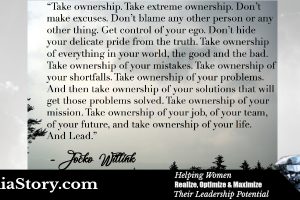Resilience requires us to look at adversity as an opportunity to become stronger. Resilience is realizing our circumstances don’t define us because we always have the freedom to choose our mindset, attitude, and outlook. With the knowledge that we can make choices comes the responsibility of choosing well. Certainly at times, it’s easy to pretend we don’t have a choice while making excuses for why we can’t overcome something.
“I am not a product of my circumstances. I am a product of my decisions.” ~ Stephen R. Covey
But, excuses won’t take you to where you want to be in life. We can take what life hands us and be bitter about it or become better because of it.
In life, we all experience pain, grief, and loss. Resilience is learning not only to survive, but also to thrive. Resilience is the difference between “I didn’t die,” and “I learned to live again.” Here are 10 Characteristics of Resilience:
- Proactive Mental Attitude: A positive, proactive mental attitude is a choice, regardless of our circumstances. It’s not always an EASY choice, but it is a choice. It’s the proactive decision to be positive, even when faced with adversity. We all have the gift of independent free will, also known as the freedom of choice. As a result, we all become the product of the choices we make.
- Conviction of Values: Our behavior is determined by the choices we make. We have the incredible ability to choose how we respond to any given set of circumstances in life. Our behavior, thoughts, feelings, and emotions can be a conscious choice based on our values, rather than a product of our emotions and feelings. You must first determine what your values are, and then you can be committed to living them.
- Intentional Habits: Resilient people realize they can build good habits to help them be happy, rather than bad habits that will only compound and increase the hurt. Make sure your habits and behaviors are serving you well. This requires taking a good hard look at your life and lifestyle, and may be uncomfortable. When you can honestly say, “This isn’t serving me or taking me where I want to go” and decrease it, eliminate it, or limit it, you will be far better off.
- Growth Mindset: A growth mindset is a commitment to personal development. It’s intentionally developing your MIND, your most precious asset. And, a growth mindset is being willing to learn from mistakes. We all make mistakes. That’s a fact. It isn’t a good thing or a bad thing, it’s simply the way it is. Growth comes when we learn from the mistakes we have made.
- High Level of Self-Awareness: Self-awareness is the ability to step outside yourself and think about how you are feeling, what you are thinking, and the emotional state you are in. It’s literally being aware of yourself. It’s the ability to realize “Hey, I’m feeling depressed (angry, upset, happy, frustrated, sad, mad). I’m thinking about ________.”
- Alignment with Purpose and Passion: You are created, called, and destined for a purpose. Discovering and growing into our purpose is a process we should joyfully seek out intentionally. It’s very rare to discover our purpose completely by accident, so we must live intentionally in order to grow spiritually and personally into the shoes God created for us to wear. And then, we will be walking in His footsteps.
- Positive Perspective of Experiences: Life is filled with pain. A mother loses her child to a drowning accident. A husband loses his wife to breast cancer. A daughter loses her innocence to sexual abuse. A family loses each other when loved ones are torn apart by blame. John C. Maxwell had this to say about the past, “The past is gone and outside your control. You are responsible for not allowing it to control you in the present.” Let it go. Put it behind you, and move on. We cannot change the past. We can only learn from it. The past has passed. Don’t let old, emotional baggage weigh you down or clutter your life today. Sometimes, we must let go of what’s behind us before we can reach what’s in front of us.
- Quality Connections with Others: The relationships in your life should be supportive, uplifting, and positive influences on you. If they aren’t, think very carefully about why you have that relationship and whether it should continue in the same form. You can love someone and yet leave them behind if they are negative influences in your life. Think quality over quantity. It doesn’t matter how many Instagram followers you have if you don’t have high quality connections with the people in your life. High quality means positive relationships with positive people.
- Appropriate Boundaries: Resilient people have boundaries in place because they know they must protect themselves. Identify what you will, and won’t, give to someone in terms of your time, energy, even money. Identify what boundaries you have in relationships. What is, and is not, acceptable in the people you allow in your life. Set your boundaries, and don’t let anyone cross them.
- Commitment to Self-Care: It’s important for everyone to know what their “best self” looks like. Your “best self” is the version of you who is the best expression of your true self on your best day. And, you can’t be your “best self” for long if you aren’t committed to taking care of yourself. It should be a priority, not a guilty pleasure to take time to care for yourself, physically, mentally, and spiritually. Exercise, eat well, and take time for prayer, meditation, or reflection. Get outside and go for a walk. Take a break. Take a nap. Enjoy the little things because taking care of yourself means you will have more to give back to others.
Interested in learning more? Join me in February 2018 for a women’s retreat to learn how to overcome the past and create the future you want!
About Ria: Like many, I faced adversity in life. Raised on an isolated farm in Alabama, I was sexually abused by my father from age 12 – 19. Desperate to escape, I left home at 19 without a job, a car, or even a high school diploma. Watch my 7 minute TEDx Talk on Resilience here.


